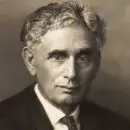
Louis Dembitz Brandeis
Louis Dembitz Brandeis was the first Jewish person to serve as a Supreme Court Justice and is widely regarded as one of the most important and influential justices in the history of the Court.
Brandeis attended the public schools of Louisville, Kentucky, and the Annen Realschule in Dresden, Germany, before entering Harvard Law School, from which he graduated at the head of his class in 1877. In 1890, Brandeis argued, in what became one of the most famous Harvard Law Review articles in history, that a right to privacy was inherent in American law. He later expanded this idea in his influential dissent in Olmstead v. United States (1928), in which he wrote “. . . to protect Americans in their beliefs, their thoughts, their emotions and their sensations [the makers of the Constitution] . . . conferred, as against the Government, the right to be let alone–the most comprehensive of rights and the right most valued by civilized men.”
Prior to joining the Court, Brandeis also made a major contribution to modern jurisprudence when he developed a new approach to arguing cases that used fact-based evidence and expert testimony, not just legal theory. This method came to be known as the “Brandeis Brief,” and became a staple of American constitutional jurisprudence.
He was appointed to the Supreme Court in 1916 by President Woodrow Wilson, but only after a bitterly contested and often antisemitic confirmation process that sought to brand him as a radical reformer. During his tenure on the Supreme Court, Brandeis was the first justice to champion freedom of speech. He was also a leading figure in the antitrust movement, particularly in his resistance to the monopolization of New England railroads by J. P. Morgan. In his books, articles, and speeches, including Other People’s Money and How the Bankers Use It (1914) and The Curse of Bigness (1934), he criticized the power of large banks, money trusts, powerful corporations, monopolies, public corruption, and mass consumerism, all of which he felt were detrimental to American values and culture. He later became active in the Zionist movement, seeing it as a solution to antisemitism in Europe and Russia, while at the same time providing a way to “revive a sense of the Jewish spirit.” Established in 1948, Brandeis University is named in his honor.